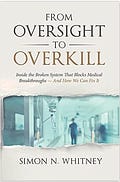"From Oversight to Overkill", How an Obscure Bureaucracy Destroyed Medical (Self-)Experimentation & Slowed Down the Engines of Scientific Innovation
Ep. 59 with Dr. Simon Whitney
This was such a quintessential “Stranded Technologies” episode: an obscure, technical bureaucracy that’s been around for decades. A hard code in the fabric of society through a federal law that slows down medical innovation that could save millions of lives. After hearing this episode, you’ll know what an IRB is and how medical research needs to be liberated.
Dr. Simon Whitney is a family physician and ethicist. He taught at Baylor College of Medicine in Houston, Texas for twenty-two years. He is retired from medical practice but continues to publish and teach about medical ethics.
He wrote the book From Oversight to Overkill: Inside the Broken System That Blocks Medical Breakthroughs—And How We Can Fix It (Rivertowns Books, 2023).
What Simon is talking about is not the behemoth U.S. Food and Drug Administration (FDA), one of the largest public agencies in the world.
The subject of his book is the Institutional Review Board (IRB) system, an institution responsible for preventing abuse of research subjects. It is run by the Office for Human Research Protection (OHRP), a small office within the United States Department of Health and Human Services (DHHS).
It is an obscure and little-known bureaucracy.
Simon uncovers how a fear-driven bureaucracy frustrates scientists by delaying research from anything between months to years and sometimes preventing important research with no harm to patients, but failing to benefit untold millions.
The medical history behind IRBs is fascinating and parallels many other stranded technologies stories.
It starts with a flexible system and lots of innovation. Medical self-experimentation was more common. It can be gut-wrenching, but it led to heroic feats of progress.
It was public health disasters that led to its demise.
Most of all the Tuskegee Syphilis Study became a widely know scandal where the United States Public Health Service (PHS) withheld life-saving treatment from 400 poor African Americans with syphilis to study its effect over 40 years.
A gross incidence of ethical misconduct.
Yet what followed was an overcorrection. The National Research Act of 1974 led to federal oversight of IRBs, leading to frivolous lawsuits and a bureaucracy stifled in fear of not doing the wrong thing, even at the cost of doing the right thing.
The incentives are again stacked against progress.
The anatomy of the IRB system going awry is instructive.
It teaches us again the need for regulatory innovation and for bold action to correct the excesses of bureaucratic overreach - ideas for inside reform seem feasible, and external inspiration by special jurisdictions can help accelerate this movement.





Niklas - thanks for shining some light on this story. I'm going to read more about it! If you haven't already seen this book making the rounds, you should check out the book “Recoding America: Why Government Is Failing in the Digital Age and How We Can Do Better.” Its not as much about regulatory capture, but more about how layers and layers of regulation make governing and service delivery difficult. I found it fascinating and I think it complements a lot of your work.